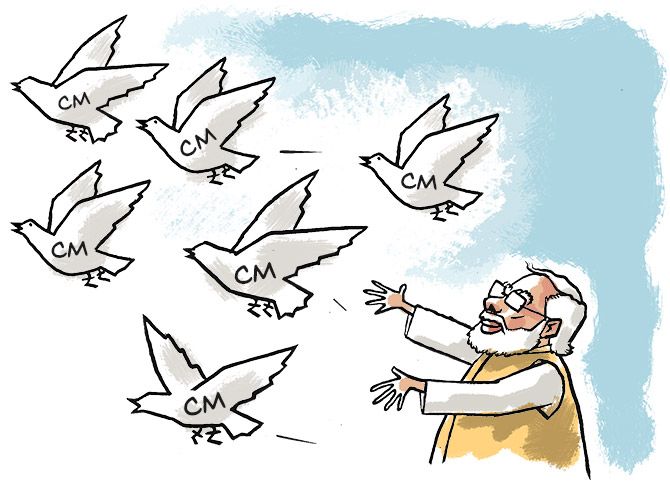States could then stop complaining about the Centre and fashion their own economic destinies, says T C A Srinivasa Raghavan.
Illustration: Dominic Xavier/Rediff.com

Ideally, income tax should be as close to zero as possible because it is a political tax of no economic significance. But that's not going to happen. However, there's something else that can be done.
Last month I said I would suggest a game-changing reform. So think about this: Why is income tax levied only by the Centre in India while in many other federations the constituent units also levy it?
Is there a reason which is unique to the Indian federation?
Do the political conditions of 1950 still persist?
Why is it not in the Concurrent List of the Constitution when so many other lesser things are in it?
How can the Constitution empower states in every possible way but this?
Excellencies, I think the time has come to debate this. And the only person who can initiate the debate is the prime minister. After all, who has suffered more as a chief minister at the hands of a vindictive central government? It even led him to abolish the planning commission.
Not just that: Who is better at breaking set ways of thinking? Narendra Damodardas Modi has a strong track record on this, especially when there are immediate political gains to be made.
Moreover, he now has the strength in Parliament to push through a Constitutional amendment that no state can possibly object to. They could stop complaining about the Centre and fashion their own economic destinies. It would be the ultimate empowering of the states.
The one caveat I have is that the states's income tax should not exceed 10% and the central income tax should not exceed 30%. All cess and surcharges should go.
India's 'normal' tax rate -- the part of income legally taken by the sovereign -- has been between 40% and 55% for almost 800 years. Yes. But for the most part it has been between 45% and 50%.
This rate of 'extraction' is why India has remained economically weak. It simply must be lowered. It is not just governments that need money to spend. Citizens do, too.
To begin with, a state income tax could be optional. Those who opt for it would lose a proportionate amount from all central devolutions. For those who don't want it, the current system could continue for as long as they don't opt in.
If there are strong political reasons, the economic reasons are even more powerful. Consider the situation now. The last finance commission raised the devolution to the states by 10% to 42%. This meant 42% of all tax revenue would go to the states.
But that high number could not be reached. If it had, the Centre would have been hard put to pay even its salaries. Now it seems it wants to go back to around 33%. (As a result it has become a supplicant before the commission which is not nice.)
In any case, no one can say what the correct percentage is -- 30%, 35%, 38%, 42%? Like the 'desirable' level of fiscal deficit of 3%, it's an arbitrary number. And like all arbitrary things, it makes no logical sense. It's a 'I think that's fair' kind of judgement.
Indeed, that semi-subjective approach is the most important reason we have been tinkering with the financial devolution levels for the last quarter of a century.
Look back at the contortions the last four finance commissions have performed and you will be left speechless at the sheer pointlessness of it.
Hence my much simpler suggestion: Let the states decide how much they need and how much they can raise. They will, I would bet, very quickly impose a tax on agricultural incomes.
There are two major objections to a states income tax. One relates to the weaker states and the other to administrative capacity.
The weaker states issue is one of central responsibility towards states that can't pay for themselves yet. The administrative capacity argument is about the ability of states -- weak and strong -- to collect tax.
Both are strong arguments, but that's why we need to start a debate because if this logic were accepted, we would never have a space programme and a nuclear programme. You have to decide on the objective and then build capacity.
We are thus left with just one major economic objection: How will the economically weaker states fare? This should be the sole problem to solve.
The rest is just being argumentative.











 © 2025
© 2025